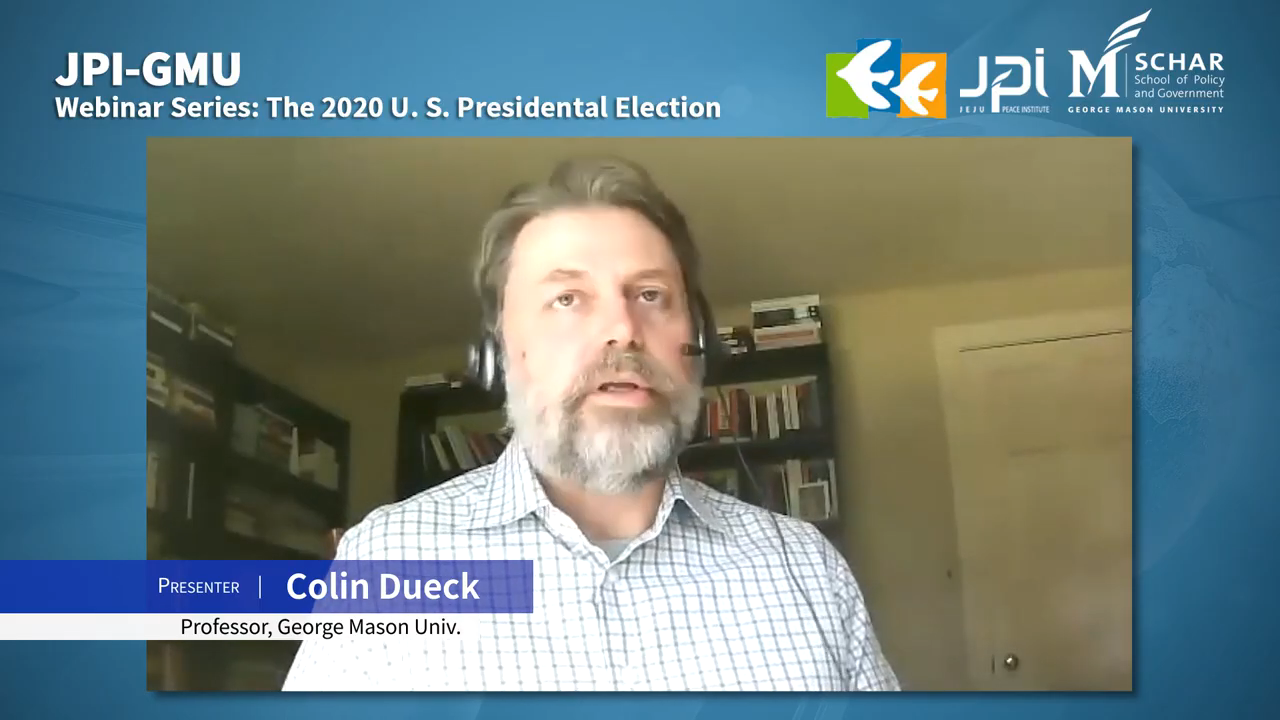Review of [JPI Online Conferences] 2020 US Presidential Election
Video Link: https://youtu.be/sJhR-RjN9EU?t=243
The online conference, “Webinar series: The 2020 U.S. Presidential Election” organized by Jeju Peace Institute (JPI) and George Mason University, was held on August 10th, 2020. The webinar was divided into four sessions and moderated by the Dean of Schar School, Mark Rozell. The second session was presented by Dr. Colin Duek, a professor at GMU, on the topic of Donald Trump’s foreign policy. The speaker focused on President Trump’s foreign policy worldview, tactics, and his overall trajectory. Bo Ram Kwon from Korea Institute for Defense Analyses (KIDA) and Professor Shang E. Ha from Sogang University participated in the session as discussants.
The speaker, Dr. Colin Duek, introduced the concept of “American nationalism” on President Trump’s foreign policy. According to his definition, Trump’s foreign policy is the re-emergence of one particular form of American nationalism against liberal internationalism. He commented that the critics who deem the Trump administration undermining the liberal world are misinterpreting the essence of American nationalism. As opposed to the critic’s point of view, he explicated the term American nationalism as “the oldest democratic American foreign policy tradition.”
Dr. Colin Duek gave further his views on President Trump’s foreign policy by referring to it as the “Trump doctrine.” He elaborated the term by mentioning the four different types of pressure campaign that the Trump administration has been implementing throughout his presidency. The first campaign presented by him was the application of leverage on adversaries regarding security issues. Countries such as China, the Democratic People’s Republic of Korea (DPRK), and the Taliban are the prime examples of the United States trying to obtain concessions on traditional security issues. The second type of pressure campaign focuses on the US’s traditional allies. These campaigns are hardly unprecedented actions taken from former US presidents. Dr. Colin Duek highlighted, however, the distinct Trump’s attitude or demand as a factor that differentiates his leadership from others by using the word “sheer bluntness.” Trump’s aggressive performances towards his allies such as South Korea, Japan, and European countries especially Germany in regard to increased defense spending were given as examples.
The last two pressure campaigns focus on economic matters. According to Dr. Colin Duek’s explanation, the third campaign targeting adversaries, particularly China on trade, was not the case prior to the Trump administration by saying “If you look at Hillary Clinton’s campaign or the other republicans that were running, there were complaints about some Chinese practices but this was not going to be one of the top handful of priorities. This is something Trump did. He changed the conversation.” He further underlined the distinctive President Trump’s form of American nationalism of pressuring the allies on economic issues when presenting the final campaign. Countries such as Canada, Mexico, and South Korea have been pressured by the Trump administration to make concessions on trade issues. In terms of Trump’s doctrine, he maintained that its intention was not to destroy the liberal order. Instead, the president’s enforcements are the responses to what he has been identifying as unjust relations with foreign communities. Therefore, rather than sticking into the Republican foreign policy tradition thoroughly, the policy has been supplemented by distinct President Trump’s foreign policy. Based on his analysis of Trump’s foreign policy view, I came up with the conclusion that the tactics are unprecedented that provide a novel trend in interstate relations. Dr. Duek seems to take an optimistic view of the Trump Doctrine. However, considering the alliance relationship, Trump’s style of policy, no matter what the original intentions were, has resulted in decreasing the credibility with its alliance. Unless Trump is heading toward an inward-looking policy, it is necessary for America to rebuild the trust that has been fragile between its allies.
During the conference, Dr. Colin Duek also brought up the question of the upcoming U.S. 2020 presidential election: Is foreign policy an issue? Despite the insignificant role of foreign policy in changing the approval rating of a presidential candidate, he asserted that “the perceptions of presidential strength or weakness, competence or incompetence can help tilt electoral outcomes especially when the country is at war.” Since President Trump has a sense of “political sensitivity” which aids him politically, the Trump administration’s stance of war in Afghanistan is about to wrap up. Moreover, in terms of 2020 U.S. presidential candidate Joe Biden, Dr. Colin Duek demonstrated his level of uncertainty about whether he is an edge on the presidential election. On the contrary, he opened the possibility of President Trump getting re-elected since the incumbent president tends to have an advantage on foreign policy. Dr. Colin Duek concluded his presentation by providing his assumptions on President Trump’s foreign policy when he gets reelected in 2020 and three possibilities of republican foreign policy post the end of Trump’s era.
Due to the upcoming presidential election, numerous assumptions have emerged regarding the outlook of post-Trump foreign policy. Amid this current circumstance fraught with uncertainty, one thing that can be guaranteed is the influence of Trump even after his presidency. Just like the former U.S. President Theodore Roosevelt, Trump is likely to have a major voice within the Republican party.
Sooyoun Kim is a sophomore majoring in Global Affairs at George Mason University Korea Campus with a concentration in Global Governance. She is also minoring in Conflict Analysis and Resolution. Her primary interests are in human security and Asia-pacific security. She hopes to broaden her knowledge in international security issues through this program.
Photo can he found here




